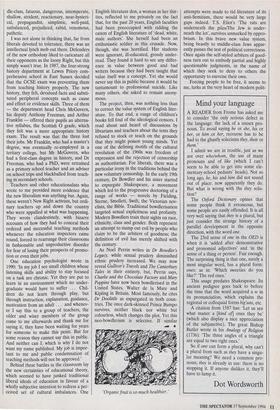Mind your language
A READER from Frome has asked me to consider 'the only serious defect in the language: the lack of a unisex pro- noun. To avoid saying he or she, his or her, or him or her, recourse has to be had to the ghastly solecisms they, their or them.'
I admit we are in trouble, just as we are over who/whom, the use of many pronouns and of like (which I can't seem to be able to get into some ele- mentary-school pedants' heads). Not so long ago, he, his and him did not sound out of place: now apparently they do. But what is wrong with the they solu- tion?
The Oxford Dictionary opines that some people think it erroneous, but some people are easily offended. It is all very well saying that they is a plural, but just consider the strange history of a parallel development in the opposite direction, with the word one.
The 23rd sense of one in the OED is when it is 'added after demonstrative and pronomial adjectives' and 'in the sense of a thing or person'. Fair enough. The surprising thing is that one, surely a most singular word, has a plural form: ones; as in: 'Which sweeties do you like?' The red ones.'
This usage predates Shakespeare. Its ancient pedigree goes back to before the time that the word acquired a w in its pronunciation, which explains the regional or colloquial forms big'uns, etc.
A citation from 1587 has: 'Let us see what maner a [kind of] ones they be' (which also display a nice appreciation of the subjunctive). The great Bishop Butler wrote in his Analogy of Religion (1736): 'The three angles of a triangle are equal to two right ones.'
So if one can form a plural, why can't a plural from such as they have a singu- lar meaning? We need a common pro- noun; they is already in use: there is no stopping it. if anyone dislikes it, they'll have to lump it.
Dot Wordsworth


























































 Previous page
Previous page